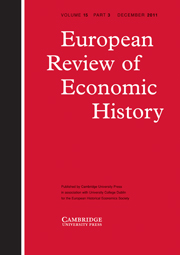Article contents
The institutional roots of Great Britain's ‘big problem of small change’
Published online by Cambridge University Press: 04 September 2009
Abstract
Thomas Sargent and François Velde (2002) argue that it took government authorities centuries to solve the ‘big problem of small change’ because those authorities were constrained, first by the lack of a sound theory of small change, and then by the lack of adequate technology for implementing the theory. British experience suggests, however, that institutions also played a crucial part. In particular, the monopolistic nature of Great Britain's official coinage arrangements undermined incentives for establishing a sound system of small change even after theoretical and technological constraints were no longer present. The institutional perspective offered here helps to explain a number of historical facts that are otherwise puzzling, including the fact that a relatively successful private-sector small-change system anticipated Great Britain's official solution to the small-change problem by two decades.
- Type
- Research Article
- Information
- Copyright
- Copyright © European Historical Economics Society 2009
References
- 4
- Cited by


